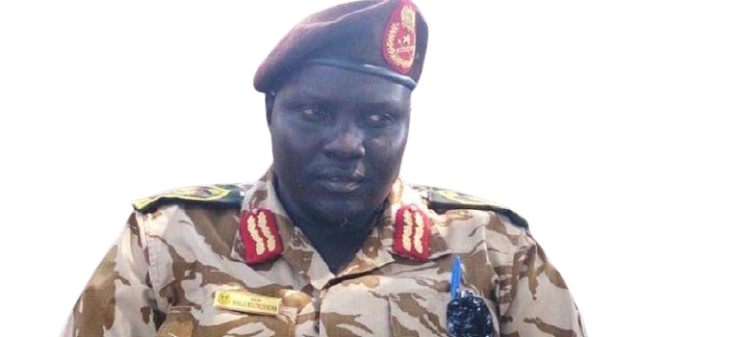South Sudanese President Salva Kiir on Wednesday dismissed the Deputy Director General of the General Intelligence Bureau (GIB) in the National Security Service (NSS), a senior position established to help unify the command of the country’s armed forces under the 2018 peace agreement.
Lt. Gen. Khalid Butrus Bora was removed from his post in a presidential decree read on state-run South Sudan Broadcasting Corporation (SSBC). No reason was given for the dismissal, and no replacement was immediately named.
The decree cited Section 17(1) of the National Security Service Act, which grants the president authority to appoint and remove security officers, including senior intelligence officials.
Gen. Khalid has played a prominent role in South Sudan’s turbulent political and military landscape. He initially served as deputy commander in the former rebel South Sudan Democratic Movement (SSDM) Cobra Faction, a Murle-led armed group once headed by Gen. David Yau Yau, now the deputy minister of information.
The group emerged from demands for greater regional representation, development, and the creation of an autonomous administration in the Greater Pibor Area.
In 2016, when Yau Yau rejoined the ruling Sudan People’s Liberation Movement (SPLM), Khalid rejected the move and assumed command of the faction, vowing to continue the armed struggle with fighters who remained in the Pibor area.
In 2017, he aligned himself with the rebel National Salvation Front (NAS), led by Gen. Thomas Cirillo. However, internal divisions within NAS in 2018 led Khalid to form the NAS–Peace Faction. He later joined the Revitalized Agreement on the Resolution of the Conflict in South Sudan (R-ARCSS) as part of the South Sudan Opposition Alliance (SSOA).
The 2018 peace agreement allowed SSOA members to participate in the Transitional Government of National Unity (RTGoNU), established in 2020, and to take part in security arrangements and the unification of armed forces.
Khalid later served as deputy minister of public service for more than two years, until he was dismissed in April 2022. That same month, he was appointed deputy director general of the GIB, in line with provisions in the peace deal aimed at integrating former rebel leaders into the national security apparatus.
In additional decrees issued Wednesday night, Kiir also dismissed Aniin Ngot Ngot as undersecretary in the Ministry of Health, appointing Kennedy Gaaniko Clement, a former deputy governor of Western Equatoria state, in his place. Aguek Ring Mabil was removed as deputy chairperson of the Relief and Rehabilitation Commission, and Makuc Makuc Ngong, a clerk in the national legislative assembly, was named to replace him.
Kiir also appointed Charles Barnaba Kisanga as technical advisor to the Ministry of Information, Communication Technology and Postal Services, and Ariath Deng Ariath as technical advisor to the Ministry of Investment.
The mini-reshuffle comes amid mounting challenges to the implementation of the 2018 peace agreement. Key provisions—including the unification of armed forces, drafting of a permanent constitution, and preparations for national elections—remain unfulfilled.




